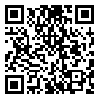BibTeX | RIS | EndNote | Medlars | ProCite | Reference Manager | RefWorks
Send citation to:
URL: http://refahj.uswr.ac.ir/article-1-1974-en.html
Objective: This survey research was proposed and sponsored by the Cultural Revolution High Council’s Secretariat. The aim is to assess the extent of work ethics and its constituents as it exists among state employees. The survey also seeks to determine factors which affect work ethics, such as status characteristics, mode of management, workers’ office organization, the environmental conditions of the office, and certain relevant social factors, all to be studied within the Tehran provincial administration. Method: This is a paper of survey research in Tehran province. Six hundreds persons of governmental organizations' members are research sample. Findings: The findings indicate that the extent of work ethics within the state organizations is higher than average and that it rests at a satisfactory level. Yet, the thought provoking point is the presence of a reverse relationship between work ethics and extent of citizenship and socio-economic status, and more importantly, with the educational background of exemplary members. Results: That is, factors such as social and political alienation, dissatisfied expectations, which may cause uncontrollable stress on members of the state organizations. Feeling of personal isolation, a retreat from social surroundings and collective values, the feelings of social and organizational injustice, and finally the lack of organizational and social participation, are among parameters found to be threatening the members of the state organizations. Moreover, this potential threat is reinforced as a member is more educated more deeply involved in citizenship activities, and enjoys higher social status.
Received: 2015/08/28 | Accepted: 2015/08/28 | Published: 2015/08/28
| Rights and permissions | |
 |
This work is licensed under a Creative Commons Attribution-NonCommercial 4.0 International License. |





